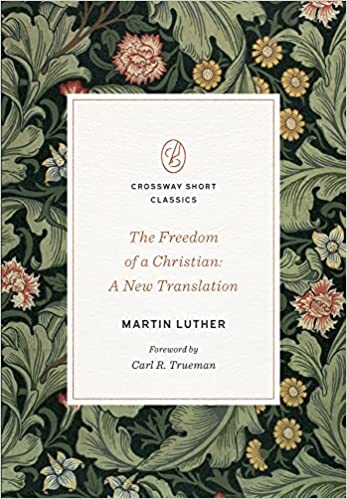A Book Review from Books at a Glance
by Ryan M. McGraw
Martin Luther is a well-known name among Protestants – at least he should be, due to his seismic influence on Western religion, thought, and culture. Though Luther’s work touches nearly everyone in the Western world today, few have likely read many, if any, of Luther’s works. Fewer still will be aware that Luther changed the world primarily through writing inexpensive tracts, or pamphlets. Together with his Babylonian Captivity of the Church and his Address to the German Nobility, The Freedom of a Christian is one of a trio of Luther’s most fundamental and formative booklets, which fanned the flames of the Protestant Reformation. Newly translated in an attractive accessible format, this little book gives readers insights into Luther’s early struggles to articulate and defend salvation through faith alone in opposition to works. Those digesting this volume will at once gain a sense of Luther’s popular and gripping writing style, as well as a taste of some of his core ideas.
As Carl Trueman notes in his introduction, this is an early text from Luther (12), though it includes “the basic dynamic of Lutheran ethics” (13). The book focuses on two main points (based partly on 1 Cor. 9:19): a Christian is “a free lord of everything and subject to no one,” and, “a Christian is a willing servant of everything and subject to everyone” (29). In other words, faith makes Christians free from depending on good works and makes them free servants both to God and to others. Luther first argues that salvation is primarily a matter of the soul, observing that the soul can “get along without everything except God’s word” (33). Stressing the foundational significance of faith for righteousness (quoting Rom. 1:17, which was pivotal in Luther’s religious life), he asserted, “faith brings with it all blessing and takes away all misfortune” (36-37). Luther clearly set forth the distinction between the law and the gospel in the sense of command versus promise (39-40), which became a distinctive feature of Lutheranism. This point enabled him to drive his readers to despair apart from Christ, producing hope only through faith, adding, “the promise from God bestows what the commandments demand” (40). Illustrating the different categories in which Lutheran, as opposed to Reformed, theology came to operate, he noted that good works do not hang on the word like faith does (41-42). Though Reformed thinkers would stress here that Scripture alone defines good works, Luther’s point seems to have been that the word leads to trust in God rather than to try to do good works to earn his favor. Though the Bible contains both law and gospel, command and promise, Luther’s primary contention was that salvation rested on faith rather than on works.
All the above being said, the ground and character of the Christian’s righteousness remained a bit ambiguous at this early stage of Luther’s career. On the one hand, he stressed that by fulfilling all the commandments, faith alone is righteousness to us because it treats God as credible (43, 47). This makes it sound as though faith itself is righteousness in the place of good works since faith is not a good work, but “the master that produces them” (48). In other words, Luther sometimes sounded like faith is our righteousness rather than Christ (61). Similarly, he compared believers to Adam in the Garden of Eden in that Adam’s righteousness preceded his good works just like ours does (64) The bottom line was that good works did not produce an upright person, but that an upright person produced good works (65). Conversely, and somewhat shockingly, he added that evil works do not damn us; unbelief does (67). Faith thus appears to be the ground of justification (rather than its instrument), just as unbelief is the ground of damnation. Faith seems to justify by actually making a person good (69).
On the other hand, Luther summarizes, “God’s honor consists in this: that he does not save us through our works but by his gracious word, given without condition and out of pure mercy” (70). Even here, it is surprising that faith is stressed instead of Christ, at least overtly, though later he adds, “From Christ these blessings flow to us” (84). On the whole, Luther was clear that our salvation rested solely on Christ, whom we receive by faith, but how our righteousness relates to Christ’s remained a little ambiguous at the time.
This volume should hold both historical and devotional importance for Christians today. Historically, we see here early expressions of the distinction (and relation) between the law and the gospel (72-73), the priesthood of believers in access to God and intercession for others (51-53), and hangover elements of medieval piety, such as the passing remark that Mary was not made ceremonially unclean by giving birth to Christ (79). The final page of this little book illustrates Luther’s primary aim: “Behold, that is the proper spiritual Christian freedom, which liberates the heart from all sins, laws, and commands” (86). Regarding our righteous standing before God, what could better free us from the dread of God’s wrath and to a life of joyful devotion to God and service to others?
Ryan M. McGraw
